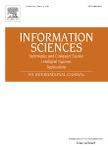版权所有:内蒙古大学图书馆 技术提供:维普资讯• 智图
内蒙古自治区呼和浩特市赛罕区大学西街235号 邮编: 010021

作者机构:Huaibei Normal Univ Sch Phys & Elect Informat Huaibei 235000 Peoples R China Guangdong Univ Technol Sch Automat Guangzhou 510006 Guangdong Peoples R China
出 版 物:《INFORMATION SCIENCES》 (信息科学)
年 卷 期:2017年第376卷
页 面:71-94页
核心收录:
学科分类:12[管理学] 1201[管理学-管理科学与工程(可授管理学、工学学位)] 08[工学] 0812[工学-计算机科学与技术(可授工学、理学学位)]
基 金:National Natural Science Foundation of China [61572224, 61304082, 41475017] National Science Fund for Distinguished Young Scholars Major Project of Natural Science Research in Anhui Province [KJ2015ZD36] Natural Science Foundation in Colleges and Universities of Anhui Province [KJ2016A639] International Science and Technology Cooperation project of Anhui Province
主 题:Evolutionary algorithm backtracking search algorithm Teaching-learning based optimisation Artificial neural network training Optimisation problems
摘 要:The backtracking search algorithm (BSA) is a recently proposed evolutionary algorithm (EA) that has been used for solving optimisation problems. The structure of the algorithm is simple and has only a single control parameter that should be determined. To improve the convergence performance and extend its application domain, a new algorithm called the learning BSA (LBSA) is proposed in this paper. In this method, the globally best information of the current generation and historical information in the BSA are combined to renew individuals according to a random probability, and the remaining individuals have their positions renewed by learning knowledge from the best individual, the worst individual, and another random individual of the current generation. There are two main advantages of the algorithm. First, some individuals update their positions with the guidance of the best individual (the teacher), which makes the convergence faster, and second, learning from different individuals, especially when avoiding the worst individual, increases the diversity of the population. To test the performance of the LBSA, benchmark functions in CEC2005 and CEC2014 were tested, and the algorithm was also used to train artificial neural networks for chaotic time series prediction and nonlinear system modelling problems. To evaluate the performance of LBSA with some other EAs, several comparisons between LBSA and other classical algorithms were conducted. The results indicate that LBSA performs well with respect to other algorithms and improves the performance of BSA. (C) 2016 Elsevier Inc. All rights reserved.